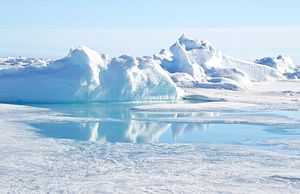Canada may have positioned itself to eventually claim sovereignty over the North Pole. Canadian Foreign Minister John Baird made a statement last week that revealed that a scientific and geographical survey regarding its claim to Arctic territories will be submitted to the UN Commission on the Limits of the Continental Shelf and may contain data robust enough to lay claim to the North Pole. The submission is necessitated by Canada’s participation in the UN Convention on the Law of Sea (UNCLOS). The move represents a bold political push by Stephen Harper’s conservative government to extend Canada’s rights in the Arctic.
The Canadian decision to assertively pursue a claim to the North Pole has a clear foundation in its national interest: the Arctic seabed is expected to contain over one-quarter of the world’s undiscovered energy resources, according to The Globe and Mail. The U.S. Geological Survey provides more specific numbers: the Arctic may contain 13 percent of the world’s undiscovered oil reserves, 30 percent of undiscovered gas deposits, and 20 percent of the undiscovered natural gas liquids.
The decision to pursue its claims to the Arctic under the rubrics of international law, based on scientific data, exacerbated tensions with Russia, which also has claims to the North Pole and is leading the push in the militarization of the Arctic Ocean. Following the Canadian announcement Putin “told his defense chiefs to concentrate on building up infrastructure and military units in the Arctic.” As fellow Flashpoints contributor J. Michael Cole reported, Russia’s military will prioritize its activities in Arctic in 2014.
The soundness of the Canadian claim is questionable and the announcement may represent an attempt to lay down a legally compliant stake to the geostrategically valuable tranche of territory north of Canada. The Economist, questioning the legitimacy of the Canadian claim, cited a troubling technical briefing with the scientists who worked on the seabed survey:
At a so-called technical briefing on December 9th, all of the tricky questions—how much more data is needed? Isn’t the North Pole clearly in waters that will eventually be claimed by Denmark?—received roughly the same answer from Hugh Adsett, the deputy legal adviser for the foreign-affairs department. He used a variation on Mr Baird’s theme that Canada wanted to put in the biggest and boldest claim possible for what is the country’s last frontier.
However robust the data, Canada will likely have to duke out the final details over its claim to the North Pole and other Arctic territories with other claimants, including Denmark and Russia (and other members of the Arctic Council). The UN Commission on the Limits of the Continental Shelf will not determine the final legal status of the territories claimed by Canada. Denmark is expected to submit its claims to the same body in the future.
UNCLOS enshrines states’ sovereign rights to waters up to 200 nautical miles out from their shores. Under certain circumstances, such as compelling scientific evidence that a states’ underlying continental shelf extends beyond that limit, it may be able to justify sovereignty of such areas without violating the terms of the convention. Part of Canada’s claim includes portions of the Atlantic seabed, conflicting with U.S., Danish and French claims.

































